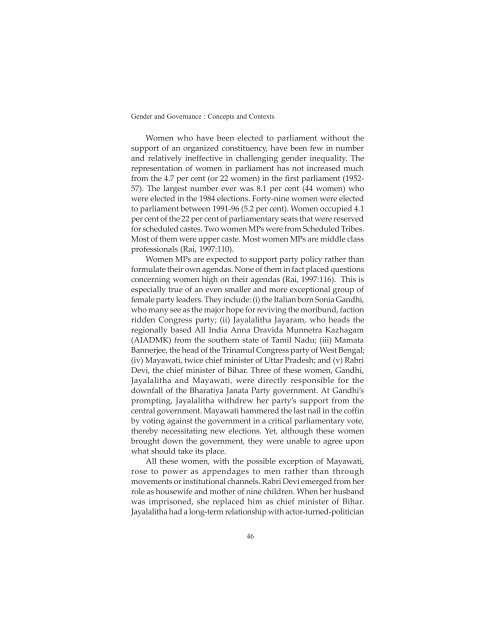Essays On Gender And Governance - United Nations Development ...
Essays On Gender And Governance - United Nations Development ...
Essays On Gender And Governance - United Nations Development ...
You also want an ePaper? Increase the reach of your titles
YUMPU automatically turns print PDFs into web optimized ePapers that Google loves.
<strong>Gender</strong> and <strong>Governance</strong> : Concepts and Contexts<br />
Women who have been elected to parliament without the<br />
support of an organized constituency, have been few in number<br />
and relatively ineffective in challenging gender inequality. The<br />
representation of women in parliament has not increased much<br />
from the 4.7 per cent (or 22 women) in the first parliament (1952-<br />
57). The largest number ever was 8.1 per cent (44 women) who<br />
were elected in the 1984 elections. Forty-nine women were elected<br />
to parliament between 1991-96 (5.2 per cent). Women occupied 4.1<br />
per cent of the 22 per cent of parliamentary seats that were reserved<br />
for scheduled castes. Two women MPs were from Scheduled Tribes.<br />
Most of them were upper caste. Most women MPs are middle class<br />
professionals (Rai, 1997:110).<br />
Women MPs are expected to support party policy rather than<br />
formulate their own agendas. None of them in fact placed questions<br />
concerning women high on their agendas (Rai, 1997:116). This is<br />
especially true of an even smaller and more exceptional group of<br />
female party leaders. They include: (i) the Italian born Sonia Gandhi,<br />
who many see as the major hope for reviving the moribund, faction<br />
ridden Congress party; (ii) Jayalalitha Jayaram, who heads the<br />
regionally based All India Anna Dravida Munnetra Kazhagam<br />
(AIADMK) from the southern state of Tamil Nadu; (iii) Mamata<br />
Bannerjee, the head of the Trinamul Congress party of West Bengal;<br />
(iv) Mayawati, twice chief minister of Uttar Pradesh; and (v) Rabri<br />
Devi, the chief minister of Bihar. Three of these women, Gandhi,<br />
Jayalalitha and Mayawati, were directly responsible for the<br />
downfall of the Bharatiya Janata Party government. At Gandhi’s<br />
prompting, Jayalalitha withdrew her party’s support from the<br />
central government. Mayawati hammered the last nail in the coffin<br />
by voting against the government in a critical parliamentary vote,<br />
thereby necessitating new elections. Yet, although these women<br />
brought down the government, they were unable to agree upon<br />
what should take its place.<br />
All these women, with the possible exception of Mayawati,<br />
rose to power as appendages to men rather than through<br />
movements or institutional channels. Rabri Devi emerged from her<br />
role as housewife and mother of nine children. When her husband<br />
was imprisoned, she replaced him as chief minister of Bihar.<br />
Jayalalitha had a long-term relationship with actor-turned-politician<br />
46

















